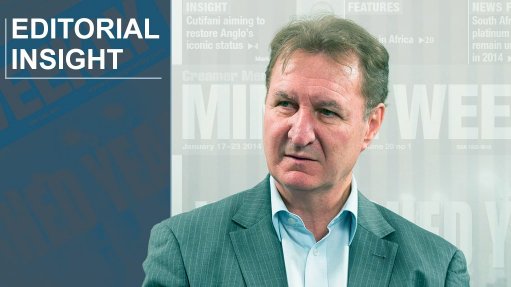
A horde of banks have seemingly rushed in eagerly to grant an eventual $15.25-billion worth of revolving credit facilities to diversified mining and marketing major Glencore, as part of a refinancing exercise. Initially launched at $14-billion, the credit facilities of the London-, Hong Kong- and Johannesburg-listed company ultimately closed substantially oversubscribed at $17-billion, after Glencore’s broad group of relationship banks showed strong support.
The company, headed by CEO Ivan Glasenberg, did well to have 60 banks, embracing 34 mandated lead arrangers and bookrunners, commit to the facilities, which refinance Glencore’s $8.7-billion one-year revolving credit facilities and amend and extend the $6.6-billion five-year revolving credit facility, both signed in June last year. Investec Securities speculates that Glencore must have secured attractive rates, with the highly successful exercise also allaying any concerns investors may have had about its gearing. Even with net end-2014 debt of $31-billion and gross debt of $50-billion, Glencore had clearly found refinancing a breeze. Glencore simultaneously announced in South Africa that it is funding a R2.76-million project in Mpumalanga to provide 200 secondary Phola community students with a video mentoring facility, which is seen as a breakthrough in education for previously disadvantaged pupils.
Nedbank has closed $540-million worth of mining financing on the continent of Africa in the last 18 months. Speaking to Creamer Media’s Mining Weekly last week, Nedbank Capital international mining finance head Nivaash Singh said the bank was very much open for business in Africa and foresaw the commodities market entering a space of supply deficit early next year, which would hopefully have a positive impact on depressed commodity prices.
Read on page 18 how, together with RMB, Nedbank has provided $100-million worth of debt financing to Aureus Mining’s Liberty Gold project, in Liberia, funded mineral sands mining company Sierra Rutile’s switch from dredge mining to dry mining, put out $150-million to Zambian copper miner First Quantum and put money behind the London-listed Gem Diamonds’ Letšeng mine, in Lesotho, and the Ghaghoo underground diamond mine, in Botswana. To watch a video on the bank’s deals, scan the barcode with your phone’s QR reader, or go to Video Reports on www.miningweekly.com.
A leading mining investment banker regards Namibia’s ‘sensible’ mineral policies, as well as the Namibian mining industry’s close working relationship with its government, as factors that are helping the Namibian economy to grow at a faster rate than the South African economy, to which it is closely tied.
Read on page 14 of this edition of Mining Weekly of Namibia’s economic growth rate being tipped to come in at 4% this year, compared with South Africa’s low 1.3% first-quarter economic growth rate. Nedbank Capital mining and metals investment banking head Paul Miller says that cooperation and collaboration between mining sector and government has had a very positive effect on the Namibian economy, with every single mining and exploration company holding membership of the local Chamber of Mines, which enables the industry to talk with one voice.